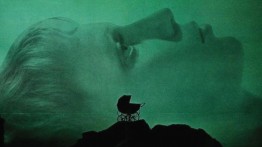COOPERMADE: Iconic Posters

The imagery and typography of a movie poster can sometimes be as memorable as the film it’s advertising. Take Rosemary’s Baby, the 1968 Roman Polanski film about a woman who suspects her husband has quite literally made a deal with the devil. The poster—a baby carriage on a rocky outcropping beneath a photo of Mia Farrow cast in a sickly green—is an essential piece of film history, named one of the top 25 movie posters by Premiere magazine. Its designer was Philip Gips A'57, a Cooper graduate who started life in the Bronx, the son of a housewife and a property manager. An avid cartoonist as a child, he earned his Master’s in art at Yale after graduating from Cooper. During his career, he worked as an art director for Monocle, a magazine of political satire, and later at Time-Life Books. He designed posters for Stephen Frankfurt, an advertising executive famed for his movie campaigns, and the two began collaborating, with Frankfurt eventually joining Gips’ advertising agency, Gips Balkind.
Though he did a wide array of work, including logo design such as the one used by ESPN today, Gips is most celebrated for designing posters for films that were cultural touchstones of their time including Downhill Racer (1969)—another Premiere top 25 with a copy housed at New York’s Museum of Modern Art—Superman (1978) (the movie that inspired fellow Cooper grad Patty Jenkins A'93 to become a director), All That Jazz (1979), Altered States (1980), Desperately Seeking Susan (1985), and Fatal Attraction (1987). Gips, who sought to make posters that heightened suspense without giving away plot points, also designed the famed cracked egg poster for Alien (1989), with a tagline by his wife, the copywriter Barbara Solinger Gips, “In space no one can hear you scream.”





